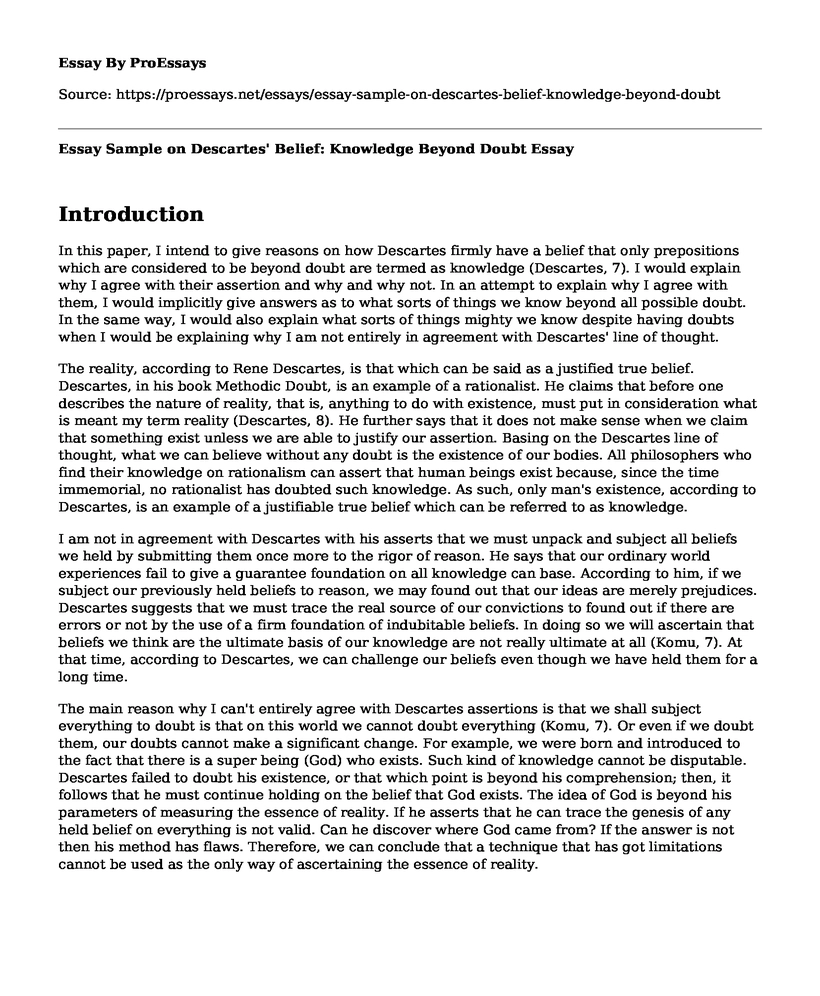Introduction
In this paper, I intend to give reasons on how Descartes firmly have a belief that only prepositions which are considered to be beyond doubt are termed as knowledge (Descartes, 7). I would explain why I agree with their assertion and why and why not. In an attempt to explain why I agree with them, I would implicitly give answers as to what sorts of things we know beyond all possible doubt. In the same way, I would also explain what sorts of things mighty we know despite having doubts when I would be explaining why I am not entirely in agreement with Descartes' line of thought.
The reality, according to Rene Descartes, is that which can be said as a justified true belief. Descartes, in his book Methodic Doubt, is an example of a rationalist. He claims that before one describes the nature of reality, that is, anything to do with existence, must put in consideration what is meant my term reality (Descartes, 8). He further says that it does not make sense when we claim that something exist unless we are able to justify our assertion. Basing on the Descartes line of thought, what we can believe without any doubt is the existence of our bodies. All philosophers who find their knowledge on rationalism can assert that human beings exist because, since the time immemorial, no rationalist has doubted such knowledge. As such, only man's existence, according to Descartes, is an example of a justifiable true belief which can be referred to as knowledge.
I am not in agreement with Descartes with his asserts that we must unpack and subject all beliefs we held by submitting them once more to the rigor of reason. He says that our ordinary world experiences fail to give a guarantee foundation on all knowledge can base. According to him, if we subject our previously held beliefs to reason, we may found out that our ideas are merely prejudices. Descartes suggests that we must trace the real source of our convictions to found out if there are errors or not by the use of a firm foundation of indubitable beliefs. In doing so we will ascertain that beliefs we think are the ultimate basis of our knowledge are not really ultimate at all (Komu, 7). At that time, according to Descartes, we can challenge our beliefs even though we have held them for a long time.
The main reason why I can't entirely agree with Descartes assertions is that we shall subject everything to doubt is that on this world we cannot doubt everything (Komu, 7). Or even if we doubt them, our doubts cannot make a significant change. For example, we were born and introduced to the fact that there is a super being (God) who exists. Such kind of knowledge cannot be disputable. Descartes failed to doubt his existence, or that which point is beyond his comprehension; then, it follows that he must continue holding on the belief that God exists. The idea of God is beyond his parameters of measuring the essence of reality. If he asserts that he can trace the genesis of any held belief on everything is not valid. Can he discover where God came from? If the answer is not then his method has flaws. Therefore, we can conclude that a technique that has got limitations cannot be used as the only way of ascertaining the essence of reality.
Works Cited
Descartes, Rene. Discourse on the method of rightly conducting one's reason and of seeking truth in the sciences. Good Press, 2019.
Komu, Seraphine Cs. "Cartesian Method of Doubt: A Critique." International Journal of Academic Research 1.3 (2019): 107-123. Retrieved from https://www.ijarbas.com/wp-content/uploads/2019/09/1.3-6-Cartesian-Method-of-Doubt-A-Critique.pdf
Cite this page
Essay Sample on Descartes' Belief: Knowledge Beyond Doubt. (2023, Mar 28). Retrieved from https://proessays.net/essays/essay-sample-on-descartes-belief-knowledge-beyond-doubt
If you are the original author of this essay and no longer wish to have it published on the ProEssays website, please click below to request its removal:
- Immanuel Kant, Friedrich Wilhelm Nietzsche, Aurobindo Ghose
- Nature Vs. Nurture Essay
- Cancer Among Asian Americans Essay
- Failure Is a Better Teacher Than Success Essay
- Critical Thinking Case Study: Kantian Ethics
- Essay Sample on Immigrant's Journey to the American Dream
- Essay Example on Identity: A Philosophical Analysis of Its Concepts and Relations







